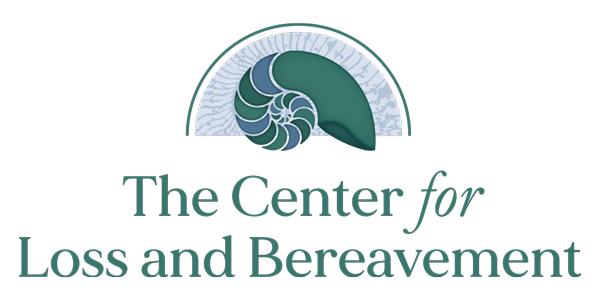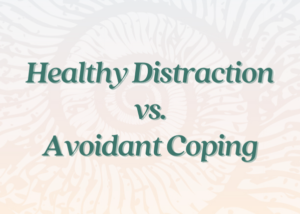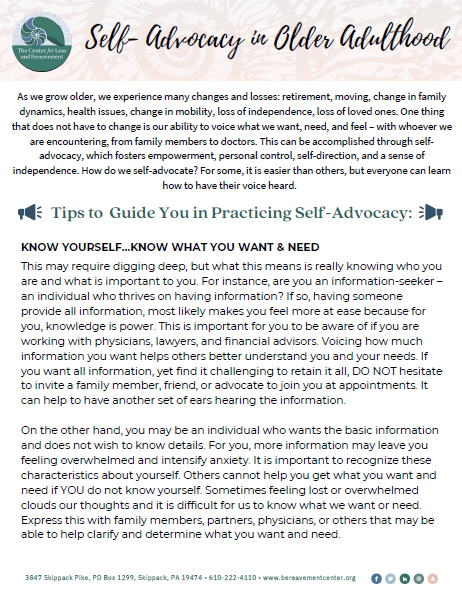CLB Grief Notes
A Grief Note On…
Grief and Forgiveness
Grief and Forgiveness
By Tammy Court- Cudd
There is a lovely Hawaiian prayer of forgiveness called ho’oponopono that states, “I’m sorry; Please forgive me; Thank you; and I love you.” These words are powerful and according to the international leader in palliative care, Dr. Ira Byock, forgiveness is one of the four things that matter most in life. However, Dr. Byock has altered the prayer to read, “Please forgive me; I forgive you; Thank you; and I Love You.” Why has a physician who works closely with dying individuals and their families at the end-of-life chosen to write a book about the four things that matter most? Because his work has led him to the understanding that one of the most important things, forgiveness – for others and for ourselves – though extremely difficult, can spare the dying and the living an enormous amount of pain and suffering. Yet for the abundant reward received when we come to forgive, it may be one of the most challenging things for us to do.
Grief and forgiveness are interrelated. Like grief, forgiveness is very much a process and not something we just will ourselves to do. Forgiveness, like grief, cannot be rushed, ordered, or engineered. Both must be experienced in their own time. There are unresolved hurts and feelings involved in grief and forgiveness and acceptance is the underlying foundation in both. Acceptance does not mean we like grief or what has been done to us but that we have come to terms with the reality of the loss or the reality of our hurt from something that has been done. However, grief is not a choice – whereas forgiveness is intentional. Unfortunately, there is no choice but to feel pain when we grieve. Forgiveness, on the other hand, can free ourselves from pain. Additionally, grief can leave an individual feeling powerless, whereas forgiveness can empower an individual. Forgiving is a choice we make and because it is within our power to choose, we can feel stronger in the power to forgive. Grief and forgiveness are two complex sides of the same coin in many ways, though they are unique experiences. When grief and forgiveness are intertwined such as in the case of the death of a spouse who may have been unfaithful, or a parent who may have been abusive, or any scenario in which a survivor feels wronged, carrying grief may feel even more intense and complex, which may complicate the grieving process.
Due to the complexity of forgiveness, many scholars not only see forgiveness as interconnected with grief but as an ongoing grieving process. We must understand that to forgive is not necessarily to forget. Nor does to forgive mean we are accepting, excusing, or condoning behavior, reconciling a relationship, and/or allowing the same harmful behaviors from an offender to continue. Forgiveness is not for the sake of the offender but for the griever. When an injustice, trauma, or situation has occurred in which we feel victimized we can hold on to feelings of anger and resentment which can trap us in our grief process and keep us stuck. Anger felt over long periods of time leads to resentment. Resentment is a chronic condition which can physically and mentally impact our well-being. The release of resentment, disappointment, and anger can result in a feeling of freedom through the release of negative energy.
Forgiveness is such a complex process that researchers, including Dr. Robert Enright from the International Forgiveness Institute, have designed various models that help explain the process of coming to forgive another. The first step is exploration of: who hurt you, the depth of your hurt, the specific incident that caused your hurt, what was said or done, your response, and the overall circumstances of the encounter. Once you have explored these areas, the four-point phase model below may help in coming to find forgiveness, over time:
- Phase 1 – Uncovering Phase
- The motto of this phase is – “We can’t heal what we don’t feel.” It is important to acknowledge feelings associated with your hurt such as anger, disappointment, sadness, fear, or whatever may be coming up for you when you think about the person who hurt you or the experience. Ask yourself how you deal with your feelings (face feelings, express them, or avoid them); are you obsessed with the injury, offender, incident; has the injury caused permanent change/damage in your life; have you been affected physically in regards to your health (anxiety/depression/stomach issues/headaches, etc.), and has the injury changed your worldview or how you view yourself?
- Phase 2 – Decision Phase
- This phase is focused on what you want to do and considering options. Looking at what is, and what can be, is important. If after uncovering that the person or incident has impacted your life in negative ways that leave you with feelings of anger, resentment, injustice, disappointment, and/or hurt – which you want to free yourself of – reviewing your options may be helpful. If/when you come to the decision that what you have been feeling and doing is not working for you any longer, you may start to entertain the idea of forgiveness. But remember, it is a process and just because you come closer to the decision to forgive does not mean all feelings of anger, resentment, disappointment, etc. subside. It is a beginning step in the process. You may have to sit with the decision for some time before moving forward in the process.
- Phase 3 – Working Phase
- This is the nitty gritty of forgiveness work and perhaps the most challenging. This phase requires you to accept the pain you have been carrying, express the pain, and find ways to view the offender in a different light, working towards compassion and understanding. Now for some offenses this is nearly asking the impossible. Again, forgiveness is not condoning, excusing, or accepting the behavior or offense but merely working towards an understanding of why a person would behave in the way they have. This does not mean you have to be “ok” with their behavior. Looking at the offender’s own family experiences may help in getting a better understanding of the individual and their behavior. We are not overlooking the behavior; we are working towards understanding. There may be incidences in which there is no way possible for you to understand, in which case empathy for a person being so misguided may be the only way to reach some sort of work in this phase.
- Phase 4 – Discovery, Deepening, and Outcome Phase
- This is the freedom phase whereby coming to forgiveness has helped you discover or find meaning in pain/suffering, helped you discover you are not alone, helped you discover a new purpose, helped you discover the power within you, and helped you discover healing yourself. No one else can heal you, you must find healing from within.
Some key points to remember in this model of forgiveness: BE PATIENT WITH YOURSELF AND KNOW THAT FORGIVENESS IS NOT EASY. We are human and before we can offer compassion and understanding to others, we must first have compassion and understanding for ourselves. Additionally, the phases in the process described above are not linear, nor are they necessarily complete, and just like grief you may find you take two steps forward, three steps back — and that’s ok.
Forgiveness has been shown to benefit one’s mental health by elevating mood, enhancing optimism, and guarding against anger, stress, anxiety, and depression (psychologytoday.com). Yet for all the benefits forgiveness offers – it can be more psychologically damaging when forgiveness is forced, insincere, or premature (eomega.org). It is important to keep in mind that if it is not within you to forgive another at this time, maybe the first step in the process is to forgive yourself and not shame or blame yourself for the inability to come to a place of forgiveness at this time. Remember, forgiveness is a process — meaning, it takes time, effort, and perspective.
Resources:
Forgiveness Is a Choice by Robert D. Enright, PhD. — internationalforgiveness.com
The Four Things That Matter Most: A Book About Living by Ira Byock
www.eomega.org/article/forgiveness-is-a-grieving-process
www.psychologytoday.com/us/basics/forgiveness
www.thewarmplace.org/forgiveness-and-grief
Join Our
Mailing List
Donate
Today
Request
Information

Affiliations
• NACG
• CBEM Changemaker
• ADEC
• Charity Navigator
Quick Links
About Us
Individual & Family Grief Counseling
Volunteer
News
Grief Support Resources
Contact
Ph: 610-222-4110
Fax: 610-222-4116
3847 Skippack Pike
P.O. Box 1299
Skippack, PA 19474
Support The Center For
Loss and Bereavement


